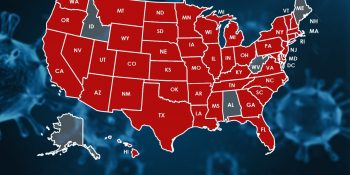LOVELAND, Colo. – A mountain lion that attacked a resident and a Larimer County Sheriff deputy Wednesday has tested positive for rabies, according to Colorado Parks and Wildlife’s wildlife pathologist.
Both bite victims have been notified and the Larimer County Department of Health and Environment is managing the rabies exposure investigation and response.
Attack Details:
At approximately 1:55 p.m. Wednesday, March 11, deputies from the Larimer County Sheriff’s Office, Colorado State Patrol, rangers from Larimer County Natural Resources and CPW wildlife officers all responded to a reported mountain lion attack west of Loveland near an RV park along the Big Thompson River.
A man and a delivery driver were talking outside a home near the Riverview RV Park when the driver noticed a mountain lion come from behind his truck. The mountain lion attacked the civilian he was talking to, inflicting injuries.
Larimer County Sheriff’s Office deputies arrived first and found the mountain lion still in the vicinity. As deputies tried to contain the mountain lion, it attacked a deputy and multiple shots were fired at the animal. As the mountain lion continued moving east across the Big Thompson River and near a residence on Black Crow Road, a CPW wildlife officer shot and killed the animal.
The attack sent both individuals to a hospital with injuries.
A necropsy of the mountain lion conducted late Wednesday night showed the male was in good body condition, weighing 91 pounds, and had a mild skunk odor.
DNA evidence was sent to Laramie for testing at the Wyoming Game and Fish Wildlife Forensic & Fish Health Laboratory. Those results are pending.
Human-Wildlife Interactions in Urban Areas:
The complex and sometimes dangerous interactions with wildlife calls to attention the challenges wildlife managers face in our urban areas. An expanding resident elk population in west Loveland is a prime food source for predators in the area, in addition to smaller prey. With the increasing herds, managers regularly deal with increased wildlife conflict, including mountain lions, along the Front Range.
“Management becomes more difficult and complex along the urban interface,” said Mark Leslie, CPW’s Northeast Region Manager. “Hunting is the most efficient tool we utilize to manage wildlife populations and that becomes especially complicated in and around our urban areas with increasing encroachment and human activity in wildlife habitat. Along the Front Range of Colorado, we need to consider alternatives that are more difficult to deploy, in conjunction with smart hunting strategies.”
Rabies in Wildlife Populations:
While it is unknown how the mountain lion contracted rabies, it is possible that it was bitten by a smaller prey animal that was also rabid. In the spring, as some wildlife become more active, CPW regularly sees an uptick in rabies activity, especially in skunks.
“Skunk rabies is endemic in the state, and skunk activity is increasing with the warming weather,” said Karen Fox, CPW’s wildlife pathologist. “Remember to keep your pets vaccinated.”
If members of the public observe a wild animal with unusual symptoms or appearing to be diseased, they should contact their local CPW office (the Fort Collins office can be reached at 970-472-4300).
If someone has come into contact with such an animal, they should contact their local public health officials immediately. The Larimer County public health number is 970-498-6775.
Mountain Lions in Colorado:
This was the 23rd known attack of a mountain lion on a human in Colorado since 1990. There were three attacks in 2019, but prior to those, the last attack occurred in 2016. Before 2019, the last time three attacks occurred within the same calendar year was 1998.
Though mountain lions are elusive, and attacks are relatively rare, it’s important to know how to avoid or manage potential encounters. To learn more about living with mountain lions in Colorado, visit cpw.state.co.us.
SPREAD THE NEWS
COMMENT, Like, Follow & SHARE @I70Scout








